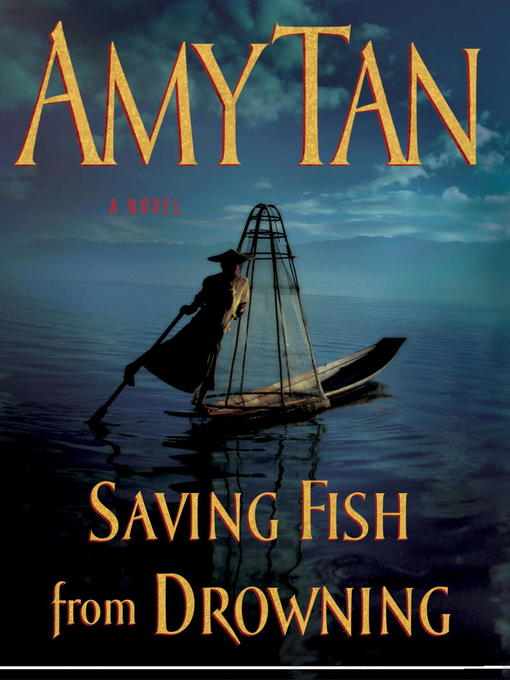
Saving Fish from Drowning
فرمت کتاب
ebook
تاریخ انتشار
2005
Reading Level
5
ATOS
6.9
Interest Level
9-12(UG)
نویسنده
Amy Tanشابک
9781440627606
کتاب های مرتبط
- اطلاعات
- نقد و بررسی
- دیدگاه کاربران
نقد و بررسی

Starred review from August 29, 2005
Tan (The Bonesetter's Daughter
) delivers another highly entertaining novel, this one narrated from beyond the grave. San Francisco socialite and art-world doyenne Bibi Chen has planned the vacation of a lifetime along the notorious Burma Road for 12 of her dearest friends. Violently murdered days before takeoff, she's reduced to watching her friends bumble through their travels from the remove of the spirit world. Making the best of it, the 11 friends who aren't hung over depart their Myanmar resort on Christmas morning to boat across a misty lake—and vanish. The tourists find themselves trapped in jungle-covered mountains, held by a refugee tribe that believes Rupert, the group's surly teenager, is the reincarnation of their god Younger White Brother, come to save them from the unstable, militaristic Myanmar government. Tan's travelers, who range from a neurotic hypochondriac to the debonair, self-involved host of a show called The Fido Files
, fight and flirt among themselves. While ensemble casting precludes the intimacy that characterizes Tan's mother-daughter stories, the book branches out with a broad plot and dynamic digressions. It's based on a true story, and Tan seems to be having fun with it, indulging in the wry, witty voice of Bibi while still exploring her signature questions of fate, connection, identity and family.

October 1, 2005
Renowned best-selling author Tan follows up "The Bonesetter's Daughter" with a novel loosely based on fact and purportedly communicated by a deceased San Francisco woman named Bibi Chen to a medium via "automatic writing." Prior to her untimely death, Bibi had arranged an excursion to China and Southeast Asia for herself and 12 friends. In her wry, satiric, yet humane voice from beyond the grave, she recounts how 11 of these friends disappear in Burma and become entangled with the misfortunes of an oppressed people in a country run by the tyrannical Myanmar military regime. Tan focuses on the hilarity and absurdity that results from cultural misunderstandings between widely different world views and suggests that even remote parts of the world cannot escape the media's tentacles, government PR spin doctors, global commercial exploitation, and a fascination with reality television. Fortunately, the light shed on these concerns does not come at the cost of character development, as we are privy to the travelers' innermost thoughts and yearnings (owing to Bibi's postmortem ability to read minds). Tan has admirably tackled the unique challenge of building a novel based on a real-life incident and turning the resulting tale into a commentary on the ironies of modern life. Recommended for all libraries. -Maureen Neville, Trenton P.L.
Copyright 2005 Library Journal, LLC Used with permission.

February 1, 2006
Adult/High School -"Fish" is based on the real-life disappearance of 12 American tourists in Myanmar. The narrator is Bibi Chen, dealer in Chinese antiquities, who had arranged an art-oriented tour for her friends. When she dies under mysterious circumstances, the others decide to proceed, saying that Bibi will join them -in spirit - -an invitation she accepts. Mostly well-meaning, but ignorant and naive, the group lands in one hilarious situation after another due to cultural misunderstandings. On a lake outing, they are kidnapped and taken to a hidden village where a rebel tribe waits for the Younger White Brother, who will make them invisible and bullet-proof and enable them to recover their land. They believe that they -ve found him in 15-year-old Rupert, an amateur magician. The tour group consists of 10 adults and 2 adolescents, some pillars of the community and some decidedly not, but all rich, intelligent, and spoiled. Bibi, feisty and opinionated, uncovers their fears, desires, and motives, and the shades of truth in their words. As the novel progresses, they become more human and less stereotypical, changing as a result of their experiences. Although Tan also satirizes the tourist industry, American Buddhism, and reality TV, her focus is on the American belief that everyone everywhere plays by the same rules. An extremely funny novel with serious undercurrents." -Sandy Freund, Richard Byrd Library, Fairfax County, VA"
Copyright 2006 School Library Journal, LLC Used with permission.

Starred review from September 1, 2005
Although Tan's fiction is vitally realistic, she is drawn to otherworldly realms, however archly. " The Hundred Secret Senses" (1995) is, in part, a ghost story, and here in her most politically astute and shrewdly satirical tale to date, her narrator, Bibi Chen, 63, speaks to us from beyond. A wealthy, autocratic Chinese American, San Francisco-based art dealer, Bibi doesn't know how she died, but she quickly adjusts to her disembodied existence and relishes her ability to tune into the thoughts and feelings of others, especially when her sophisticated friends decide to go ahead with the lavish and somewhat risky trip she organized to China and war-torn Burma (Myanmar in the parlance of the current tyrannical regime). As the 12 travelers, including a celebrity dog trainer, an evolutionary biologist and her psychologist husband, and a bamboo grower and his teenage son, set out, Bibi, smart and irreverent, is riveted by their wild misadventures. For all their political correctness, the travelers turn into ugly Americans in their pursuit of comfort and amusement until a renegade tribal group kidnaps them in the belief that Rupert, 15, is the messiah according to their unique hodge-podge of animistic, Buddhist, and Christian beliefs. Tan, marvelously liberated, attains new heights with her piquant humor and ship-of-fools cast of charmingly cranky characters. Writing with stinging irony about oppression, genocide, culture clashes, religion, media spin, and corruption, she slyly considers the unintended consequences of everything from a thwarted seduction to a war based on lies. (Reprinted with permission of Booklist, copyright 2005, American Library Association.)

























دیدگاه کاربران